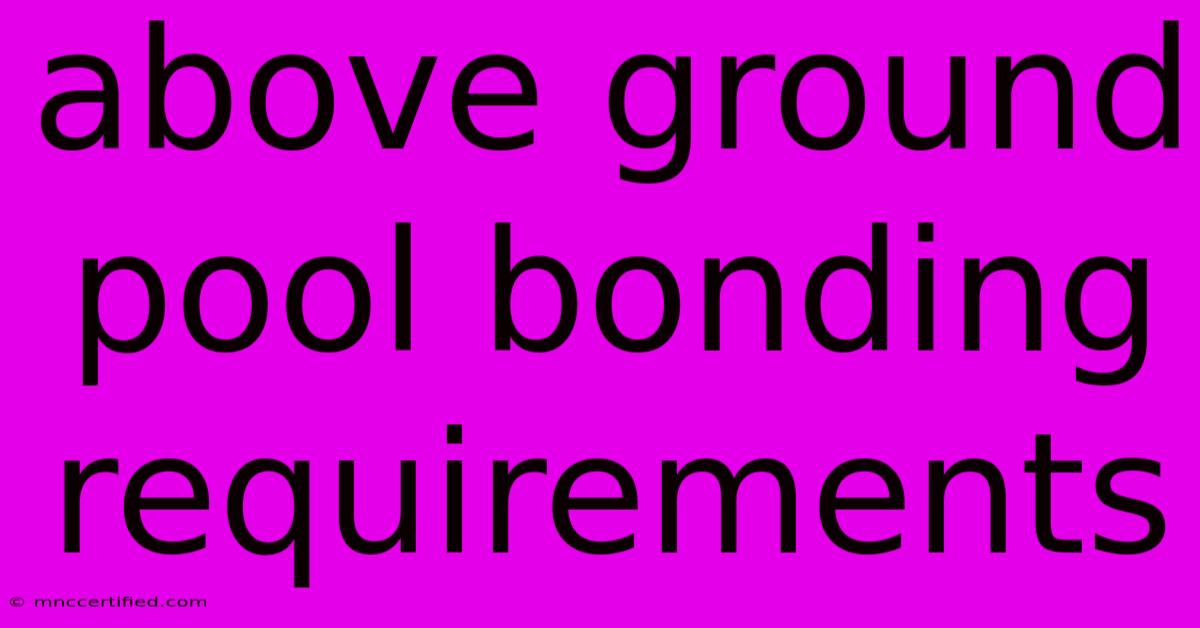Above Ground Pool Bonding Requirements

Table of Contents
Above Ground Pool Bonding Requirements: Ensuring Safety and Peace of Mind
Owning an above ground pool is a fantastic way to enjoy the summer months, but it's crucial to prioritize safety. One vital aspect of pool safety is proper bonding. Bonding protects against electrical shock hazards, ensuring a worry-free swimming experience for you and your family. This article delves into the above ground pool bonding requirements and explains why they are essential.
What is Pool Bonding?
Pool bonding involves connecting all metal parts in and around the pool to a grounding electrode system. This creates a continuous path for electricity to travel, bypassing the water and preventing electrical shock. The grounding electrode system is typically connected to the ground rod or the cold water pipe.
Why is Pool Bonding Essential?
- Electrical Shock Protection: Electrical appliances like pumps, lights, and filters can develop faults. If a live wire comes into contact with the pool water, it can create a dangerous electrical current. Bonding ensures that the electricity is diverted to the ground, preventing electric shock to anyone in the pool.
- Preventing Corrosion: Bonding also helps prevent corrosion on metal parts in and around the pool. By creating a continuous electrical path, it prevents galvanic corrosion, which occurs when dissimilar metals are in contact with water.
Above Ground Pool Bonding Requirements:
The specific requirements for above ground pool bonding vary depending on your location and the National Electrical Code (NEC) edition in use. However, here are some general guidelines:
- Bonding All Metal Parts: All metal parts within 5 feet of the pool water must be bonded, including:
- Pool Structure: The pool itself (including the metal ladder, handrails, and any metal components).
- Electrical Equipment: The pool pump, filter, heater, lights, and any other electrical equipment.
- Surrounding Structures: Metal fences, railings, and other structures within 5 feet of the pool.
- Grounding Electrode: A grounding electrode system is required. This can be a ground rod driven into the ground or a connection to the cold water pipe.
- Bonding Cable: Use a suitable bonding cable, typically copper, to connect all metal parts to the grounding electrode system.
- Inspection: It's crucial to have a qualified electrician inspect your bonding system to ensure it is installed correctly and meets all local codes.
Recommended Bonding Practices for Above Ground Pools:
- Use a Dedicated Grounding Rod: Having a separate grounding rod specifically for the pool is recommended for maximum safety and to ensure that the bonding system is independent of the house's electrical system.
- Consider a Ground Fault Circuit Interrupter (GFCI): GFCI outlets are crucial safety devices that interrupt the flow of electricity in case of a fault. Installing GFCI outlets for all electrical appliances in and around the pool is highly recommended.
- Periodic Inspections: Regularly inspect your bonding system for any signs of damage or deterioration. Ensure the connections are tight and the bonding cable is in good condition.
DIY Bonding: A Cautious Approach
While some aspects of pool bonding can be DIY projects, it's crucial to understand that working with electrical systems requires specialized knowledge and expertise. If you lack confidence in your electrical skills, always seek professional assistance.
Ensuring Your Pool is Safe
Proper pool bonding is essential for the safety of everyone using your pool. By following these guidelines and seeking professional guidance, you can ensure that your above ground pool is a safe and enjoyable place for you and your family. Remember, prioritizing safety is always the best investment.

Thank you for visiting our website wich cover about Above Ground Pool Bonding Requirements. We hope the information provided has been useful to you. Feel free to contact us if you have any questions or need further assistance. See you next time and dont miss to bookmark.
Featured Posts
-
Scherzinger Responds To Russell Brand Hat Backlash
Nov 09, 2024
-
Florida Coach Golden Investigated For Stalking
Nov 09, 2024
-
Heretic Movie Ending A Religious Critique
Nov 09, 2024
-
How Much Does Tow Truck Insurance Cost
Nov 09, 2024
-
Samson Stars In Indias 61 Run T20 Win
Nov 09, 2024